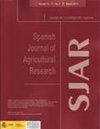西班牙西南部有机和常规管理下杏仁品种的表型、生长和产量
IF 0.8
4区 农林科学
Q3 AGRICULTURE, MULTIDISCIPLINARY
引用次数: 4
摘要
研究目的:通过对商品杏仁品种生理和农艺反应的评价,促进有机生产系统在杏仁作物上的可持续农业实施。研究领域:瓜达尔基维尔河谷的灌溉杏仁。材料与方法:从2017 - 2021年连续4个季节,对5个杏仁品种在有机和常规生产管理下的落叶、物候、树木生长、叶片氮磷储量、蚜虫敏感性和果实产量等生理农艺方面进行了评价。主要结果:与常规果园相比,有机地块的花密度、树木生长和杏仁产量较低,落叶程度较早和强烈,对蚜虫的敏感性较高。在有机管理和常规管理下,‘Lauranne’的产量最高。在两种管理下,‘Marcona’的花密度较高,活力中等,但对蚜虫最敏感,产量较低。研究重点:灌溉杏仁的种植仍然存在许多困难,特别是虫害和疾病的控制,因为使用环境友好型农药,其效果不如化学品。这些致病因素和营养等其他因素尤其影响作物的产量,尽管与传统系统的差异会随着时间的推移而减少。尽管存在这些困难,但有机杏仁的高附加值以及消费者对健康环境做法和食品安全的日益增长的需求,都是继续和发展可持续农业研究的动力。本文章由计算机程序翻译,如有差异,请以英文原文为准。
Phenology, growth, and yield of almond cultivars under organic and conventional management in southwestern Spain
Aim of study: To advance implementation of sustainable agriculture from organic production system on almond crop by means of the assessment of physiological and agronomical responses of commercial almond cultivars.
Area of study: Irrigated almond in the Guadalquivir River Valley.
Material and methods: Physiological and agronomic aspects of almond such as defoliation, phenology, tree growth, N and P leaf reserves, susceptibility to aphids and fruit yield were assessed on five almond cultivars under organic and conventional production management during four consecutive seasons from 2017 to 2021.
Main results: A lower flower density, tree growth, and almond production, an earlier and more intense defoliation degree, and a higher susceptibility to aphids were observed in the organic plot compared to the conventional orchard. 'Lauranne' was the cultivar that showed the best productivity under organic and conventional management. 'Marcona' showed the higher flower density and medium vigor, although was the most susceptible cultivar to aphids and the less productive cultivar under both managements.
Research highlights: Cultivation of irrigated almond still presents numerous difficulties, especially the control of pests and diseases due to the use of environmentally friendly pesticides which are less effective than chemicals. These pathogenic factors and others such as nutrition especially affect the yield of the crop, although the differences with the conventional system are reduced over time. Despite these difficulties, the high added value of organic almonds together with the increasing demands by consumers of healthy environmental practices and food safety are a stimulus to continue and develop research on sustainable agriculture.
求助全文
通过发布文献求助,成功后即可免费获取论文全文。
去求助
来源期刊

Spanish Journal of Agricultural Research
农林科学-农业综合
CiteScore
2.00
自引率
0.00%
发文量
60
审稿时长
6 months
期刊介绍:
The Spanish Journal of Agricultural Research (SJAR) is a quarterly international journal that accepts research articles, reviews and short communications of content related to agriculture. Research articles and short communications must report original work not previously published in any language and not under consideration for publication elsewhere.
The main aim of SJAR is to publish papers that report research findings on the following topics: agricultural economics; agricultural engineering; agricultural environment and ecology; animal breeding, genetics and reproduction; animal health and welfare; animal production; plant breeding, genetics and genetic resources; plant physiology; plant production (field and horticultural crops); plant protection; soil science; and water management.
 求助内容:
求助内容: 应助结果提醒方式:
应助结果提醒方式:


